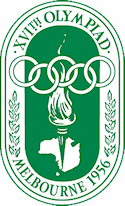 1956 Melbourne Highlights 1956 Melbourne Highlights
- Revolution in Hungary! Russians
Invade...world protests, does nothing
- Hungary finishes fourth in overall
Gold, taking 30 Gold, 20 Silver and 15 Bronze!
- "Blood in the Water" - legendary Hungary vs. Russia Waterpolo
match! Hungarian Water Polo continues to dominate winning 4th Gold
- Legendary Fencers, Aladar Gerevich and Pal Kovacs win 5th Gold! Teammate Rudolf Karpati wins 3rd!
- Gymnast Keleti Agnes Wins 4
Gold Medals: Three Individual one as member of Team Hungary!
- After Bronze in 1952, Women's Gymnastics Team takes Gold!
- Boxing Legend Papp Laszlo wins Third Consecutive
Gold Medal - First Boxer to Win Three!
Hungarian Medals!
Medal |
Name |
Event |
|
Papp László |
Boxing / ökölvívás nagyváltósúly 71 kg |
|
Kárpáti Rudolf |
Individual Fencing / vívás kard egyéni |
|
Takács Károly |
25m rapid fire pistol / gyorstűzelő pisztoly |
|
Keleti Ágnes |
Gymnastics / felmás korlát |
|
Keleti Ágnes |
Gymnastics Beam / gerenda |
|
Keleti Ágnes |
Gymnastics Floor / műszabadgyakorlat |
|
Bodó Andrea |
Team Rythmic Gymnastics / kéziszer csapat |
|
Kertész Alíz |
Team Rythmic Gymnastics / kéziszer csapat |
|
Korondi Margit |
Team Rythmic Gymnastics / kéziszer csapat |
|
Köteles Erzsébet |
Team Rythmic Gymnastics / kéziszer csapat |
|
Keleti Ágnes |
Team Rythmic Gymnastics / kéziszer csapat |
|
Tass Olga |
Team Rythmic Gymnastics / kéziszer csapat |
|
Kárpáti Rudolf |
Team Fencing / vívás kard csapat |
|
Kovács Pál Ádám |
Team Fencing / vívás kard csapat |
|
Keresztes Attila |
Team Fencing / vívás kard csapat |
|
Hámori Jenő |
Team Fencing / vívás kard csapat |
|
Magay Dániel |
Team Fencing / vívás kard csapat |
|
Gerevich Aladár |
Team Fencing / vívás kard csapat |
|
Fábián László |
Kayak Canoe / kajak-kenu K-2 10,000 m |
|
Urányi János |
Kayak Canoe / kajak-kenu K-2 10,000 m |
|
Bolvári Antal |
Team Waterpolo / vizilabda csapat |
|
Boros Ottó |
Team Waterpolo / vizilabda csapat |
|
Gyarmati Dezső |
Team Waterpolo / vizilabda csapat |
|
Hevesi István |
Team Waterpolo / vizilabda csapat |
|
Jeney László |
Team Waterpolo / vizilabda csapat |
|
Kanizsa Tivadar |
Team Waterpolo / vizilabda csapat |
|
Kárpáti György dr. |
Team Waterpolo / vizilabda csapat |
|
Markovits Kálmán |
Team Waterpolo / vizilabda csapat |
|
Mayer Mihály |
Team Waterpolo / vizilabda csapat |
|
Szívós István |
Team Waterpolo / vizilabda csapat |
|
Zádor Ervin |
Team Waterpolo / vizilabda csapat |
|
Olga Orban-Szabo |
Individual Fencing / vívás kard egyeni  |
|
Kovács József |
Track and Field / atlétika 10,000 m |
|
Rozsnyói Sándor |
Track and Field Hurdles / akadályfutás 3,000 m |
|
Keleti Ágnes |
Gymnastics / torna összetett egyeni |
|
Polyák Imre |
Wrestling / birkózás kötöttfogás 62 kg |
|
Székely Éva |
Swimming breastroke / úszás 200m mell |
|
Hatlaczky Ferenc |
Kayak Canoe / kajak-kenu K-1 10,000 m |
|
Hernek István |
Kayak Canoe / kajak-kenu C-1 1,000 m |
|
Parti János |
Kayak Canoe / kajak-kenu C-1 10,000 m |
|
Balthazár Lajos dr. |
Team Fencing / pb. tőr csapat |
|
Berzsenyi Barnabás |
Team Fencing / pb. tőr csapat |
|
Marosi József |
Team Fencing / pb. tőr csapat |
|
Nagy Ambrus dr. |
Team Fencing / pb. tőr csapat |
|
Rerrich Béla dr. |
Team Fencing / pb. tőr csapat |
|
Sákovics József (Szecsődi József) |
Team Fencing / pb. tőr csapat |
|
Bodó Andrea |
Team Gymnastics / torna összetett csapat |
|
Keleti Ágnes |
Team Gymnastics / torna összetett csapat |
|
Kertész Alíz |
Team Gymnastics / torna összetett csapat |
|
Korondi Margit |
Team Gymnastics / torna összetett csapat |
|
Köteles Erzsébet |
Team Gymnastics / torna összetett csapat |
|
Tass Olga |
Team Gymnastics / torna összetett csapat |
|
Tumpek György |
Swimming butterfly / úszás 200 m pillangó |
|
Tass Olga |
Gymnastics vault / lóugrás |
|
Nagy László |
Figure Skating - pairs / műkorcsolya páros |
|
Nagy Marianna |
Figure Skating - pairs / műkorcsolya páros |
|
Sákovics József |
Team Fencing / vívás tőr csapat |
|
Tilli Endre |
Team Fencing / vívás tőr csapat |
|
Fűlöp Mihály |
Team Fencing / vívás tőr csapat |
|
Gyuricza József |
Team Fencing / vívás tőr csapat |
|
Marosi József |
Team Fencing / vívás tőr csapat |
|
Farkas Imre |
Kayak Canoe / kajak-kenu C-2 10,000 m |
|
Hunics József |
Kayak Canoe / kajak-kenu C-2 10,000 m |
|
Kiss Lajos |
Kayak Canoe / kajak-kenu K-1 1,000 m |
|
Mohácsi Ferenc |
Kayak Canoe / kajak-kenu C-2 1,000 m |
|
Wieland Károly |
Kayak Canoe / kajak-kenu C-2 1,000 m |
|
Francisc Horvat (Horváth Ferenc) |
Wrestling, Men's Greco-Roman Bantamweight  |
Search all
1956 medalists (in Hungarian)
|

Communist "Rákosi" Flag |

1956 Revolution, a "Lyukas Zászló" |

1956 "Kossuth Arms" Flag of the Republic raised in Melbourne |
1956 - Revolution in Hungary!
Flag of the New
Republic Flies Over Melbourne!
The 1956 Olympics was bittersweet indeed. The 1956 Hungarian Revolution was the first tear in
the Iron Curtain. Hungarians from all walks of life rose up against insurmountable
odds to fight the brutal Soviet installed Hungarian communist government.
Thousands died fighting, others tortured and executed, while 200,000 were
forced to flee.
When officials raised
the communist-Hungarian flag, the Olympic Village received numerous calls objecting to it not being the
Kossuth Arms flag adopted during the Hungarian uprising. The flag was
vandalized one night, with the red star of communism being removed from
the center and replaced by the Kossuth Arms with a mark of mourning.
When the Village staff requested clarification from the newly formed,
free Federal
government, they were informed that the Kossuth Arms flag was being
flown in Budapest and therefore was the correct flag.
Blood in the Water:
Hungary vs.
The Soviet Union...
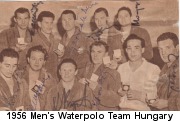 Amid
all the tension caused by the Soviet invasion of Hungary, Hungary
and the Soviet Union met in a water polo match, one of the most famous
water polo matches in history.
The game was played in a packed stadium with many Hungarian-born Australians
in the crowd. In addition to the political tension it was also a crucial
game in terms of the water polo competition. If Hungary were to win
it would almost be assured of the gold medal. Amid
all the tension caused by the Soviet invasion of Hungary, Hungary
and the Soviet Union met in a water polo match, one of the most famous
water polo matches in history.
The game was played in a packed stadium with many Hungarian-born Australians
in the crowd. In addition to the political tension it was also a crucial
game in terms of the water polo competition. If Hungary were to win
it would almost be assured of the gold medal.
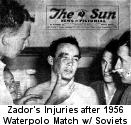 The
match was rough from the beginning but became increasingly violent
after Hungary took a 4-0 lead in the second half. At one point a Hungarian
player, Ervin Zador, was heavily knocked by a Soviet
player and emerged from the pool with serious facial bleeding. The
crowd became enraged and police were called to prevent a riot. The
match was abandoned shortly before full time and Hungary was credited
with a victory. This ultimately secured it the gold medal after the
completion of other matches. The
match was rough from the beginning but became increasingly violent
after Hungary took a 4-0 lead in the second half. At one point a Hungarian
player, Ervin Zador, was heavily knocked by a Soviet
player and emerged from the pool with serious facial bleeding. The
crowd became enraged and police were called to prevent a riot. The
match was abandoned shortly before full time and Hungary was credited
with a victory. This ultimately secured it the gold medal after the
completion of other matches.
Many of the Hungarian team were not able to return to their
homeland to rejoice in this victory, choosing instead to remain in
Australia or seek refuge in other countries rather than return to
their war-ravaged country.
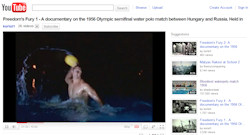 In 2007, the film "Freedom's Fury," (A szabadság Vihara) directed by Colin Gray and Megan Raney (The Sibs), was released. The critically acclaimed, hard-hitting feature documentary about the Hungarian Revolution of 1956 and the "Bloodiest Game in Olympic History," tells the story of the fateful moment in 1956 when Hungary explodes in a popular revolt and climaxes with the infamous water polo showdown between Hungary and the Soviets at the Melbourne Olympics. Now kno In 2007, the film "Freedom's Fury," (A szabadság Vihara) directed by Colin Gray and Megan Raney (The Sibs), was released. The critically acclaimed, hard-hitting feature documentary about the Hungarian Revolution of 1956 and the "Bloodiest Game in Olympic History," tells the story of the fateful moment in 1956 when Hungary explodes in a popular revolt and climaxes with the infamous water polo showdown between Hungary and the Soviets at the Melbourne Olympics. Now kno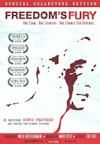 wn as the “Blood in the Water Match,” the documentary follows the journey of the Hungarian Olympic water polo team and its young star, Ervin Zador, who find themselves the unwitting focal point of the most politicized sports match ever played. wn as the “Blood in the Water Match,” the documentary follows the journey of the Hungarian Olympic water polo team and its young star, Ervin Zador, who find themselves the unwitting focal point of the most politicized sports match ever played.
See Trailers of "Freedom's Fury" on YouTube or buy the film on AHF's Amazon store!
 Featured
Olympian, Deszo Gyarmati: Featured
Olympian, Deszo Gyarmati:
(b. 10/23/1927 Miskolc, d. )
The Greatest Water
Polo Player of All-Time...
Deszo Gyarmati's feat of winning water polo medals at
five successive Olympic Games (gold 1952, 1956, 1964; silver 1948;
bronze 1960) has never been matched. He also captained winning
Hungarian teams at the 1954 and 1962 European Championships. An
excellent swimmer with a best time of 58.5 seconds for 100m (quite
fast in that era), Gyarmati was called the "world's fastest water
polo player." He was ambidextrous and could play either back or
forward. Gyarmati was considered a Hungarian national hero. He coached
the Hungarian team that won the Olympic title in 1976 and later became
a member of Parliament. He is featured in the documentary film, Freedom's Fury, available on on AHF's Amazon store! . .
Trivia:
-
Gyarmati married the 1952 Olympic 200m breaststroke
champion Eva Székely
-
In 1957, when the post-revolution,
communist puppet government learned that Deszo and Eva
were planning to defect, four men dragged Deszo to an
abandoned building and beat him to a bloody pulp,
leaving him for dead. He survived, and they used
forged passports to flee the country with their
daughter, Andrea who would later become a world record
swimmer and Olympic Silver Medalist in 1972.
 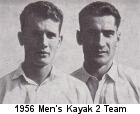
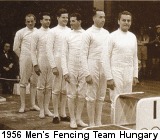 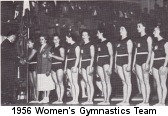
|



